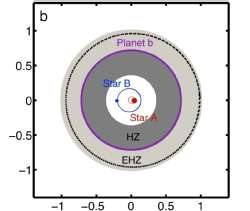Scientists searching for Earth-type planets should consider two-star system, researchers say

(�鶹��ԺOrg.com) -- A group of astrophysicists from The University of Texas at Arlington plans to expand the discussion about a newly discovered planet orbiting two stars by presenting a study suggesting where an Earth-type planet could exist in the system.
The Kepler-16 System made headlines in September when researchers at NASA’s Kepler space telescope mission revealed the discovery of Kepler-16b, a cold, gaseous planet orbiting both stars, like Star Wars’ fictional Tatooine.
The UT Arlington team, using data from the Kepler and previous research, have concluded that an Earth-type planet could exist in the system’s “habitable zone” as an exomoon orbiting Kepler-16b. They also think an “extended habitable zone” exists outside the orbit of the gaseous planet, under certain conditions. To host life in that zone, a terrestrial planet orbiting the two stars would need to have high levels of greenhouse gases in its atmosphere such as carbon monoxide or methane, they said.
Billy Quarles, a doctoral student in the UT Arlington College of Science, will present the findings at the annual meeting of the American Astronomical Society on Jan. 9 in Austin. Co-authors on the work are UT Arlington Department of �鶹��Ժics professor Zdzislaw Musielak and associate professor Manfred Cuntz.
“This is an assessment of the possibilities,” said Musielak, a two-time winner of the prestigious Humboldt Prize for his work in astrophysics. “We’re telling them where a planet has to be in the system to be habitable. We’re hoping they will look there.”
The Kepler Mission is a space telescope launched by NASA in 2009 that measures light from 150,000 stars. Scientists working with Kepler data look for changes in stellar brightness that suggest a transit, or a planet passing in front of a star. They use measurements of the star’s luminosity to determine whether the planet is in a “habitable zone,” an area where the planet would be orbitally stable and where conditions hospitable to the formation and sustainment of life could exist.
The UT Arlington team based their conclusions about an “extended habitable zone” outside the orbit of Kepler-16b on work by scientists such as NASA’s Michael A. Mischna. That research says life could be found outside the traditional habitable zone, but it requires a more extreme planetary atmosphere, one in which chemicals in the atmosphere create a strong back-warming effect, Quarles said.
“There is less light from the star, so the planet itself has to maintain more heat,” he said.
In addition to their presentation at the AAS meeting, the UT Arlington team hopes to publish its findings soon. Cuntz said the work demonstrates how the search for habitable planets requires both the development of theory and observations.
“This work is informed by observations and it has the potential to trigger more observations,” he said.
Pamela Jansma, dean of the UT Arlington College of Science, said the University is proud to have the team of researchers selected from scientists across the country to present at the American Astronomical Society meeting.
“This is the type of work that captures the imaginations of students and gets them excited about exploring a career in science. It’s certain to catch the attention of other researchers and spark even more examination,” she said.
Provided by University of Texas at Arlington



















